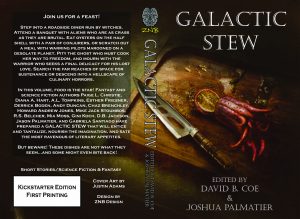Dear Friends,
About five weeks ago, I announced on various platforms that I would be withdrawing from social media for a while, and would also be delaying the releases of some upcoming projects. My announcement prompted expressions of sympathy and friendship from so many of you and I am deeply grateful for the love and support I have received since then.
I am, at this point, beginning once more to dip my toes in the social media waters. The family health crisis that prompted my pull-back from various platforms continues and will be on-going for months to come. I ask for your patience, your understanding, and your respect of our privacy as we cope with the issues at hand. Nancy, our daughters, and I are fortunate in so many ways. We love each other, we communicate well, we support one another. We also have at our disposal resources — stable finances, excellent health coverage and health care, mental health support — that too many people in this country — in this world — don’t enjoy. And we have marvelous friends and loving extended family who are bolstering us and helping us in every manner possible. We will get through this.
In the meantime, as I have seen to my own emotional well-being, I have learned a great deal, confirming things I thought I knew about myself, and discovering other things that have surprised and even shocked me. I am 58 years old, and I am still growing and deepening my understanding of my own mind and emotional history.
One discovery that probably surprised me more than it should have is this: A quarter of a century plus into my literary career, the simple act of sitting down each day to write is still both a boon and a salve for my tender emotions. Day after day, I have immersed myself in my current world and narrative and character arcs. And not only has working been good for me, it has been gratifying. I can’t always tell while writing a book if the finished product is going to be any good. Often, I’ll finish my first draft and then start to read through the novel, expecting to be horrified, only to find instead that what I’ve got is decent. And it’s possible that with this book, since I think maybe it’s pretty good, I’ll read it through and find that it totally sucks.
But I don’t think so. I am enjoying it far too much. I am 80,000+ words in at this point, shooting for a finished product of 90-95K. I expect to complete draft number one by the end of this week.
As to my pending releases, I hope to release the first of the Thieftaker novellas, “The Witch’s Storm,” within the next six weeks or so. Two more novellas, “The Cloud Prison,” and “The Adams Gambit” will follow. I hope that RADIANTS, my new supernatural thriller, will be out sometime late this summer or early this fall. And I know that DERELICT, the anthology from Zombies Need Brains that I have co-edited with Joshua Palmatier, will be released late this spring or early in the summer.
In short, while my family and I are weathering a difficult stretch, life — professional and personal — must go on. I am not yet ready to resume my three-blog-posts-a-week social media regimen, nor do I expect to be as active on Facebook and Twitter as usual. And my plans in terms of convention appearances remain uncertain.
But I will be more visible in the weeks and months to come than I have been since mid-March. Again, I am grateful for your support, your patience, and, most of all, your continued friendship.
Be well, be kind to one another, and find joy in the love and companionship of the people who mean the most to you.
David









 And I’ll start with this: Joshua and I are generous readers. We will read an entire story, even when it’s pretty clear halfway in (or a quarter in…) that the story probably won’t make the cut. Your goal as a writer is to sell us a story, obviously. But really your goal is to make us consider your story on your terms. Here’s what I mean by that: We are expecting to get somewhere between 300 and 400 submissions, for a total of 6 or 7 slots. (Last year, for GALACTIC STEW, we received 409 and selected 7.) Read those sentences again; I’ll wait.
And I’ll start with this: Joshua and I are generous readers. We will read an entire story, even when it’s pretty clear halfway in (or a quarter in…) that the story probably won’t make the cut. Your goal as a writer is to sell us a story, obviously. But really your goal is to make us consider your story on your terms. Here’s what I mean by that: We are expecting to get somewhere between 300 and 400 submissions, for a total of 6 or 7 slots. (Last year, for GALACTIC STEW, we received 409 and selected 7.) Read those sentences again; I’ll wait.